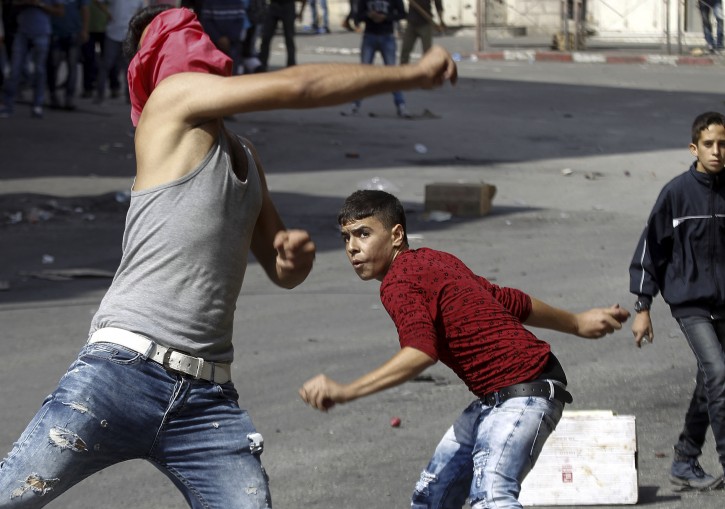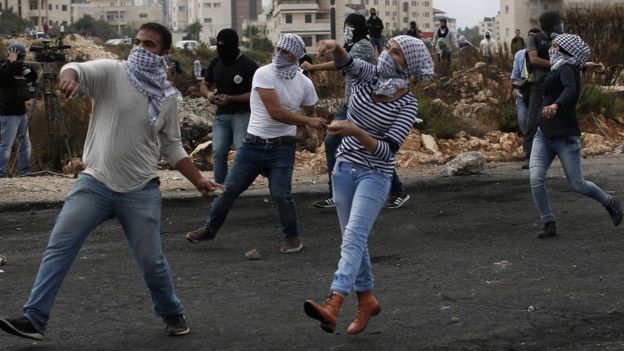'We will be the leaders'

Many of the photos taken in the last week of Palestinian resistance show exuberant young men making almost balletic moves. They are of course more attractive to photographers but they do express more than the many words written the mood of liberation / anger which is moving amongst the young. September 21, 2015 at the main entrance of Bethlehem where this currrent uprising began. Photo by Musa al-Shaer/ AFP.
3rd intifada?
PA at odds with Palestinians as West Bank protests escalate
By Killian Redden, Ma’an
October 09, 2015
BETHLEHEM — The fierce clashes that have swept the occupied West Bank over the past week, injuring over 900 Palestinians, have revealed a contradiction in the Palestinian Authority’s claim to represent the Palestinian people.
While President Mahmoud Abbas has called for a political solution through “peaceful means and nothing else,” a poll last month showed that most Palestinians now view an armed intifada, or uprising, as the only route to change.
“The future is black,” said Layla, a resident of al-Azzeh refugee camp in Bethlehem, where large numbers of youths have clashed with Israeli soldiers in recent days. She can recall the devastation of the last intifada — which most Palestinians believe achieved little — but said a new uprising was now the only means to end Israel’s nearly 50-year military occupation.
“If there was leadership, there would be no intifada,” she said, “But there is no leadership.”

Undercover Israeli police (wearing keffiyehs) make an arrest near Beit El, near Ramallah, October 7, 2015. Photo by Mohamad Torokman / Reuters
For many Palestinians, the PA is not only ineffective, but a body actively seeking to prevent change.
One local civil servant told Ma’an: “To achieve our national goals, we should raise an intifada against the Palestinian Authority, because they are the hand of Israel.”
“Achieving that would be a big victory — an earthquake for Israel.”
He said that many Palestinians were slowly recognizing the PA is an “obstacle to freedom, that they are traitors,” although he added that most with such views were “living underground.”
Security coordination
PA security forces have had a thin presence during the latest clashes, but Israeli security experts remain confident the PA’s close security coordination will be pivotal to preventing the outbreak of a sustained uprising.
“There remains a mechanism for coordination and for consultation,” said Mark Heller, a security analyst in Israel’s Institute for National Security Studies.
As long as Abbas remains in power, Heller said, he will act to prevent the outbreak of an intifada because he is convinced that a breakdown of law and order would be harmful for Palestinians.
Yoram Schweitzer, another expert at the Israeli research institute, agreed that security coordination was “crucial” to preventing a sustained uprising.
He said that Abbas continues to exercise a high degree of authority over PA security forces, which he believes “are more consolidated now than they have ever been.”

Palestinian protesters from the Aida refugee camp clash with Israeli soldiers in the West Bank, 06 October 2015. Photo by EPA
For the moment, they are standing back from the clashes, in a bid to give Palestinian protesters “an outlet to rage and resentment,” he said.
But ultimately, if it seemed they were crossing “a certain line” — in which the protesters began to harm Israelis — the PA would step in to prevent a further escalation.
‘The rabbit and the lion’
Many working under the PA — the largest employer in the occupied Palestinian territory — continue to support its strategy of applying pressure on Israel internationally, while remaining non-confrontational at home, even coordinating on security.
Another civil servant told Ma’an that it was not for Palestinians to decide whether to carry out an intifada, but a decision to be made by the Palestinian leadership.
He said only “radicals” and religious extremists sought an intifada — those interested in chaos and the destruction of the PA.
That the PA’s employees are members of Palestinian society has often — though not always — served to restrain them from acting forcefully against Palestinian protesters.

Beit El, October 6th. Photo by EPA.
According to the analyst Schweitzer, while the PA regularly detains members of Islamic Jihad and Hamas as part of its security coordination with Israel, they choose to hold “conversations” with members of Fatah and issue “warnings.”
An intelligence official in Bethlehem confirmed there had been a number of these “conversations” since the most recent clashes began, with the PA seeking to persuade members of their own communities of the folly of violent protest.
“You should understand that there’s the weak side and the strong side, the rabbit and the lion,” the intelligence official told Ma’an.
“We are the rabbit. The rabbit must give one of its children to the lion if it means it can survive.”
‘Peace is hopeless’
Irrespective of politics, many of an older generation have expressed weariness at the prospect of a third intifada after the last proved so ineffective.
This is the chief reason Israeli analyst Heller believes there is little “immediate” risk of a sustained uprising. “Adults still have vivid memories of how things happened before,” he said.

Throwing a petrol bomb towards Israeli security forces during clashes at the Qalandia checkpoint. Photo by Abbas Momani / AFP / Getty Images
However, with more than half the Palestinian population under the age of 20, experience may not deter as many as he would think.
One resident of Azzeh camp, Fadi, told Ma’an that he feared frustration was pushing many of the younger generation away from Fatah’s non-confrontational stance to what he believed to be the more aggressive position of Hamas, or even the Islamic State group.
The youths that took to Bethlehem’s streets to clash with Israeli soldiers were eager for an uprising and openly scorned the efforts of the PA.
“All of the people now are with an intifada,” a local university student told Ma’an, “only the president is against it.”
“Leadership?” said another student, Tareq. “We don’t care about leaders. We will be the leaders.”

Beit El, October 7th, photo by Abbas Momani / AFP.
“Peace is hopeless,” said yet another student, Salah al-Din. He said that while Abbas might stand against an intifada, the rest of the PA would ultimately join — “because they are of the people.”
Some names have been changed.

Killian Redden, editor and staff writer at Ma’an news, Bethlehem
